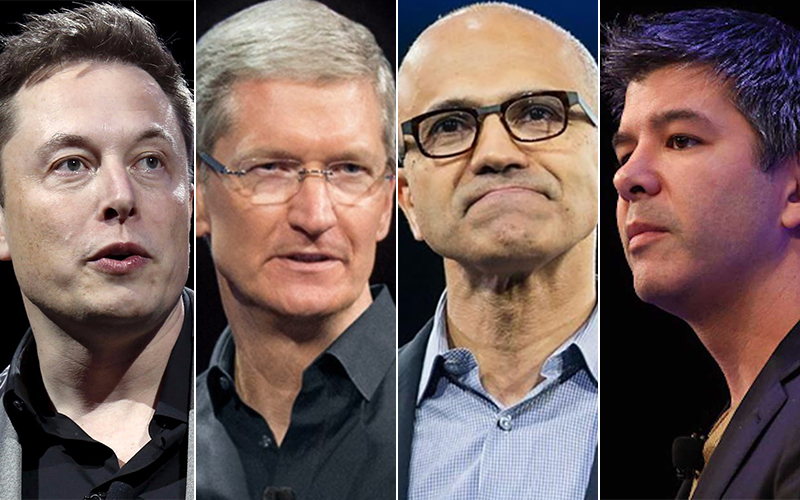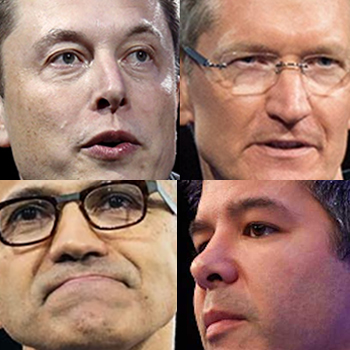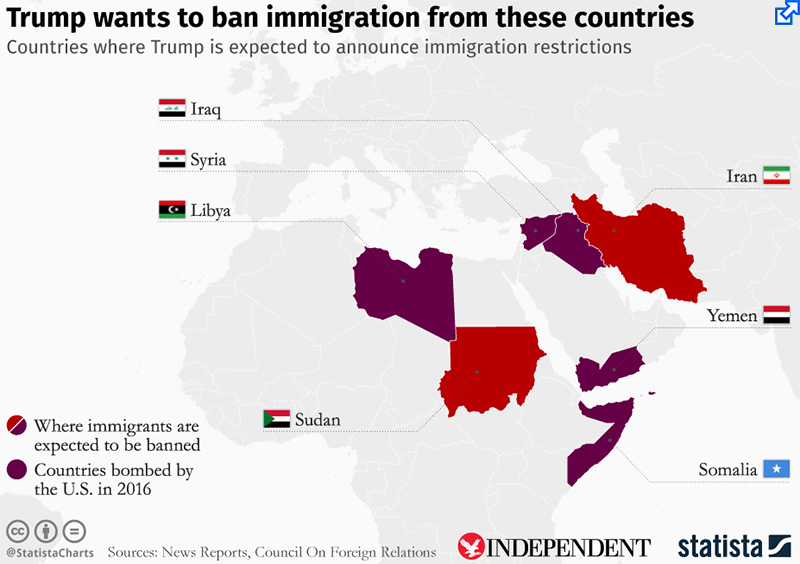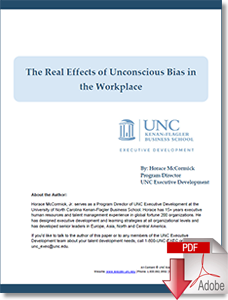Technology Business Leaders Vow to Fight President Trump’s Immigration Ban

Silicon Valley took the lead over the weekend in corporate resistance to President Donald Trump's clampdown on immigration, financing legal opposition, criticizing the plan, as well as helping employees ensnared by his executive order.
President Donald Trump’s executive order on Friday calling for a 90-day ban on nationals from seven predominantly Muslim countries entering the United States spurred responses across the technology industry from major tech companies including Google, Apple and Uber.
“It’s painful to see the personal cost of this executive order on our colleagues,” Google CEO Sundar Pichai said in a memo to his staff on Friday, according to Bloomberg.
“We’ve always made our view on immigration issues known publicly and will continue to do so,” he added.
“Our first order of business is to help Googlers who are affected,” he said, according to the Wall Street Journal.
“If you’re abroad and need help please reach out to our global security team.
A Google spokesperson echoed Pichai’s sentiment in statement emailed to The Hill.
“We’re concerned about the impact of this order and any proposals that could impose restrictions on Googlers and their families, or that could create barriers to bringing great talent to the United States,” Google said.
“We’ll continue to make our views on these issues known to leaders in Washington and elsewhere.”
Later Saturday, Apple CEO Tim Cook offered his own response to Trump’s executive orders.
“It is not a policy we support,” Cook said in an internal email to employees. “Apple believes deeply in the importance of immigration - both to our company and to our nation's future.”
Cook met with lawmakers on Capitol Hill Friday to discuss tax and technology policy and dined with Ivanka Trump and Jared Kushner on Thursday evening.
Facebook CEO Mark Zuckerberg wrote a post critical of Trump’s immigration policies on Friday.
“Like many of you, I'm concerned about the impact of the recent executive orders signed by President Trump,” Zuckerberg wrote.
A Facebook spokesperson told The Hill that the company is “assessing the impact on our workforce and determining how best to protect our people and their families from any adverse effects.”
Microsoft CEO Satya Nadella also weighed in a post on LinkedIn.
“As an immigrant and as a CEO, I've both experienced and seen the positive impact that immigration has on our company, for the country, and for the world. We will continue to advocate on this important topic.”
In an internal blog post obtained by The Hill, IBM’s Senior Vice President of Human Resources Diane J. Gherson issued an update to employees on the company’s response to Trump’s orders.
“Our first priority has been to identify and engage IBMers who may be affected, in order to provide any assistance they need,” Gherson wrote.
“We have identified and contacted the three IBMers directly affected by the executive order, and none have concerns at this time. We will also do everything we can to ensure that IBMers with affected families are supported and receive the assistance they need.”
Gherson also specified contacts at the company that IBM employees could call or email to ask questions.
IBM CEO Ginni Rometty is an adviser on Donald Trump’s Strategic and Policy forum along with other tech leaders like SpaceX and Tesla CEO Elon Musk and Uber CEO Travis Kalanick.
Both Musk's and Kalanick’s company spoke out on the orders.
“Tesla believes that the blanket entry ban on citizens from certain primarily Muslim countries is not the best way to address the country’s challenges,” said a Tesla spokesperson.
A source with knowledge of the matter said that Tesla’s human resource and legal teams were working on helping the small number of Tesla employees affected by the order.
In an email to Uber employees obtained by The Hill, Kalanick wrote that “ban will impact many innocent people,” and said he would mention this on Friday at Trump’s first business advisory group meeting.
Kalanick noted that many drivers from countries affected by the visa ban may be traveling outside of the U.S. and unable to re-enter and earn an income for at least three months.
“We are working out a process to identify these drivers and compensate them pro bono during the next three months to help mitigate some of the financial stress and complications with supporting their families and putting food on the table,” Kalanick said.
The Uber CEO further outlined how he would help affected drivers in a Facebook post on Sunday.
Uber competitor Lyft told riders Sunday in an email that it would donate $1 million to the ACLU in response to Trump’s ban.
Homesharing app Airbnb announced Sunday that it would offer free housing to travelers affected by Trump’s orders.
On Friday, Twitter CEO Jack Dorsey tweeted, “11% of Syrian immigrants to the U.S. are business owners, more than triple that of U.S.-born business owners.”
Slack CEO Stewart Butterfield took aim at what he called an “outrageous Trump act” on Twitter.
Netflix CEO Reed Hastings who had consistently blasted Trump throughout the election wrote in a Facebook post, “Trump's actions are hurting Netflix employees around the world, and are so un-American it pains us all. Worse, these actions will make America less safe (through hatred and loss of allies) rather than more safe.”
Some tech companies and leaders who had ripped Trump during the election were slow to criticize the real estate developer after his victory. Many in Silicon Valley extended a hand to the newly elected president, and tech’s top leaders had what was by many accounts an amiable meeting with him in Trump Tower.
But the mood appears to have shifted a week into his administration.
Washington, D.C., technology lobbying groups also expressed concern to Trump’s ban.
“We are troubled by reports that even lawful permanent residents are now unable to return from abroad and many more of our employees,” said Information Technology Industry President and CEO Dean Garfield.
“The internet industry is deeply concerned with the implications of President Trump’s executive order limiting immigration and movement into the United States,” said internet company lobbying group, the Internet Association President and CEO Michael Beckerman.
“The executive order signed yesterday has troubling consequences,” Beckerman added.
“Internet Association member companies – along with companies in many other industries – include legal immigrant employees who are covered by these recent executive orders and will not be able to return back to their jobs and families in the U.S.”
Source: The Hill

Every month, Ipsos conducts a survey to find out what the world is worrying about. Our infographic above shows that in November, 'immigration control' was keeping a larger share of Brits awake at night than in any other country. Respondents could select up to three 'worries, with those in Great Britain choosing 'immigration control' the most often ahead of 'healthcare' (34 percent) and 'poverty and social inequality' (30 percent).
Related Article: When Being Smart Isn’t Enough: Shephard’s Tabletop Illusion - Are These Tabletops Identical?
Company Spotlight: Google
Google has publically admitted that when it comes to diversity, it could do better.
In May, 2014, Google went public with some dismal diversity numbers, admitting that 70 percent of its 56,000 employees were men, only 3 percent were Latino, and only 2 percent were African American. And in 2013, only three of its 36 executives were women (Guynn, 2015 and Manjoo, 2014).
Google blamed the lack of diversity, in part, on unconscious bias and announced a “bias-busting” initiative. The initiative includes workshops and hands-on sessions designed to help employees identify and address their unconscious biases.
So far, about 2,000 Google employees have participated in the workshops, and more than half of all employees have also watched a 90-minute seminar that was taped and made available on YouTube (Guynn, 2015).
Although the program is still fairly young, Google executives have reported some progress. When a new building was opened at Google’s California headquarters, employees were quick to notice - and point out - that most of the conference rooms were named after men.
Google promptly renamed several of the rooms for historically important women (Buckley, 2014). And, says Jason Buberel, a product manager who trains employees in spotting unconscious bias, the training has made employees more comfortable in recognizing unconscious bias and in calling out themselves and others for it.
Source: Guynn, 2015
Download the White Paper: The Real Effects of Unconscious Bias in the Workplace
Article Topics
Apple News & Resources
Apple Overtaken as World’s Largest Phone Seller Major Earthquake Hits Taiwan. How Will This Affect the Supply Chain? Foxconn Purchases $91M Chip Plant to Further Apple’s Electric Vehicle Plans Apple Cuts Revenue Forecast, Citing Weak China iPhone Sales amid Trade Tensions Apple Plans Major US Expansion Including a New $1 Billion Campus in Austin Texas Apple Accelerates $350 Billion Contribution to US Economy and Job Creation over Next Five Years Supply Chain Leaders Become Societal Leaders More AppleLatest in Supply Chain
Spotlight Startup: Cart.com Walmart and Swisslog Expand Partnership with New Texas Facility Nissan Channels Tesla With Its Latest Manufacturing Process Taking Stock of Today’s Robotics Market and What the Future Holds U.S. Manufacturing Gains Momentum After Another Strong Month Biden Gives Samsung $6.4 Billion For Texas Semiconductor Plants Apple Overtaken as World’s Largest Phone Seller More Supply Chain

















